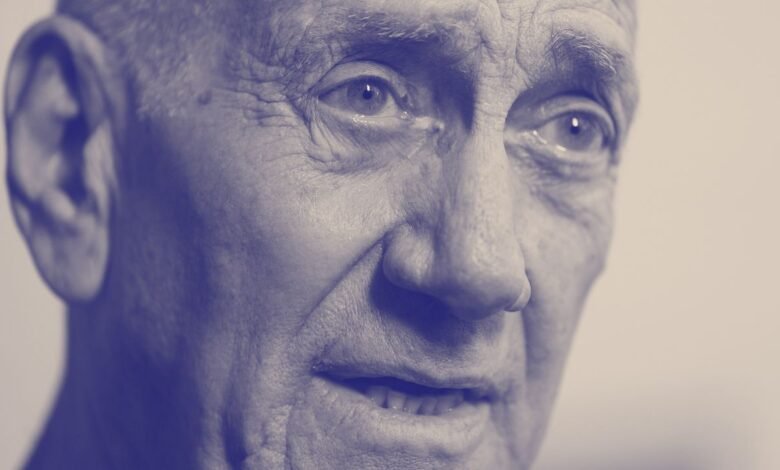Why Ehud Olmert Thinks His Country Is Committing War Crimes

Last week, Ehud Olmert, a former Prime Minister of Israel, publicly denounced his successor, Benjamin Netanyahu, and the war Netanyahu has been waging in Gaza. In a piece for Haaretz, titled “Enough Is Enough. Israel Is Committing War Crimes,” Olmert referred to the current government as a “criminal gang” led by Netanyahu. He wrote, “What we are doing in Gaza now is a war of devastation: indiscriminate, limitless, cruel and criminal killing of civilians. We’re not doing this due to loss of control in any specific sector, not due to some disproportionate outburst by some soldiers in some unit. Rather, it’s the result of government policy—knowingly, evilly, maliciously, irresponsibly dictated. Yes, Israel is committing war crimes.” Olmert’s comments follow Israel’s decision to finally allow humanitarian aid into the Gaza Strip, after a near-total blockade for more than two months led the United Nations and even the Trump Administration to issue warnings that the population was facing starvation. But Israel has tried to distribute the aid under a new scheme that humanitarian organizations and the United Nations have warned is insufficient and dangerous, in part because it requires many Gazans to travel long distances to receive aid. In the last several days, scores of Gazans have been killed by Israeli forces while trying to get food and other necessities at the few locations where they are on offer.
Olmert, who served as Prime Minister between 2006 and 2009, was once a member of Netanyahu’s Likud Party, before joining and then leading the more centrist Kadima Party. As Prime Minister, he took steps to reach a peace accord with Palestinians, but failed to do so; allegations of corruption cut short his political career. (Olmert eventually served more than a year in prison, starting in 2016.) I recently spoke by phone with Olmert about his criticisms of the war. During our conversation, which has been edited for length and clarity, we also discussed his understanding of Netanyahu’s motivations, whether the Israeli government has a plan for Palestinians in Gaza, and why the crisis in Israel is about more than Netanyahu’s ability to stay in power.
In your recent Haaretz piece, you write, “I took every available opportunity to distinguish between the crimes we have been accused of, which I refused to admit, and the carelessness and indifference regarding Gazan victims and the unbearable human cost we’ve been levying there. The first accusation I rejected, the second I admitted to. In recent weeks I’ve been no longer able to do so.” What did you mean, and what changed?
Look, no government, not even Bibi’s government, which as you know I don’t support, and certainly not the high command of the Army, gave explicit orders to kill indiscriminately, to shoot indiscriminately wherever, whatever, doesn’t matter. That’s not the case. For a long period of time, the war was perceived as legitimate, and I defended the government on that ground. The Israeli counteroffensive was recognized as just considering the brutal attack of Hamas on the 7th of October. There was a need to find Hamas leaders wherever they were hidden, sometimes underground, and in public facilities. And, even when there was a relatively high number of victims among the people living in Gaza, the understanding was that you can’t, on the one hand, recognize Israel’s right to find the leaders and the fighters of Hamas and, on the other hand, deny that they are embedded in the most densely populated areas, where there are many, many civilians. And you can’t find them without causing collateral damage, which was not liked, but which was not a purpose of the military effort. And therefore, regardless of the high number of victims, it was accepted by the international community.
What has happened lately is that it is obvious to everyone that there is no purpose that can justify the expansion of these military activities. There is not any goal that can justify continuing the military operation at the risk of losing the hostages, at the risk of losing the lives of Israeli soldiers, and the risk of losing the lives of many of the non-involved people in Gaza. There is not any purpose. The perception in Israel is that this is a personal war or illegitimate war that is being conducted exclusively because of the political interests of the Prime Minister. This is a crime. This is not something that can be defended. And the fact that there are so many victims can’t be justified. It’s as simple as that.
At the beginning, the war had more international legitimacy, but pretty early on, in, say, December of 2023, President Biden, who was a supporter of the war and was in fact arming Israel, called Israel’s bombing “indiscriminate.” Israel at various times cut off aid and caused a real humanitarian crisis, too.
Cutting aid is a different aspect. You didn’t ask me directly about Biden, but I have an enormous positive emotional attitude to President Biden. Personally, I like him. I know him. We’ve been kind of friends for many years. I think that there couldn’t be a better friend, a more dedicated Zionist in the White House than Biden was, and the criticism against him is outright arrogance and something that can’t be accepted, and can’t be tolerated.
O.K., well, we don’t need to debate President Biden.
O.K., I don’t want to debate, but I want to be on record saying it about him.
I just want to be clear that the concerns about Israel’s conduct in the war did not arise recently.
No, no, it’s true that criticism about the conduct of the war didn’t arise recently. But between criticism and an outright accusation of war crimes, there is still a certain distinction, and I think that even those who criticized Israel from overseas were careful. I’m not talking about N.G.O.s, pro-Palestinian organizations. I’m talking about governments that were friendly to Israel, like the U.S. government, like the British government, like the French government. Macron criticized Israel for a considerable time. He didn’t speak half a year ago the way he speaks now. The difference is a result of what is perceived to be a non-legitimate expansion of the military operation, and the understanding that Netanyahu doesn’t want to reach an agreement with Hamas for the release of the hostages.
Right, but people have been saying that Netanyahu wants to drag the war on for political reasons for well over a year.
I’ve been saying it. I called to end the war more than a year ago.
You also write, “I do not share the opinion of former Chief of Staff Moshe Yaalon, who said that Israel is carrying out ethnic cleansing. But we are nearing the point when it will be undeniable that such is the unavoidable result of what the government, the military and our brave soldiers have been doing in practice.” Can you expand on that, and why you don’t share Yaalon’s opinion?
I think that the present policy of the government is not yet an active effort to deport the people of Gaza from where they live. However, when you hear [the right-wing ministers] Itamar Ben-Gvir and Bezalel Smotrich—they’re not bystanders, they’re not outsiders. They are the key members of this government. They are the key spokesmen of this government. When they say that all of Gaza is Hamas and therefore there is no one that deserves to be given food and that they all have to be deported, this is what it is. [Smotrich and Ben-Gvir proposed denying aid to Gazans and expelling them from the Strip in the first months of the war.] It can be interpreted as ethnic cleansing. It’s not that we are really forcing hundreds of thousands of people across the border. But when you hear these things, you can’t remain indifferent, you can’t overlook it. You can’t just hear it and say, “O.K., let’s move on.” No, no. This is something that is totally intolerable. Anyone that has any position that doesn’t draw the inevitable conclusion is potentially a partner to a crime of a very, very serious manner.
This makes me think of something that comes up later in your piece. You write, “Yes, we’ve been denying Gazans food, medicine and basic living needs as part of an explicit policy. Netanyahu, typically, is trying to blur the type of orders he’s been giving, in order to evade legal and criminal responsibility in due course. But some of his lackeys are saying so outright, in public, even with pride: Yes, we will starve out Gaza.” So, you believe the starvation is intentional, but cleansing Gaza—even if it may happen in practice, and ministers in Netanyahu’s government want it—is not? It seems like you’re making a distinction between Israel’s intent in terms of starvation and the intent in terms of ethnic cleansing. Is that accurate?
Let’s put it this way. First of all, for a period of time, starvation was the practical policy of the Israeli government. Humanitarian supplies were denied. Denied. Actively denied and stopped and held. There was not yet, at any period of time, an active policy of deporting people. [Ethnic cleansing is not by itself a crime in international law, but usually refers to the intentional forcible displacement of an ethnic population from a certain area regardless of whether it includes crossing a border.] But on both the humanitarian needs and the deportation or cleansing of Gaza of its residents, Ben-Gvir and Smotrich are on record advocating for them, pushing for them, supporting them, calling for them, and also threatening the government that they will break it down if it does not accomplish them.






